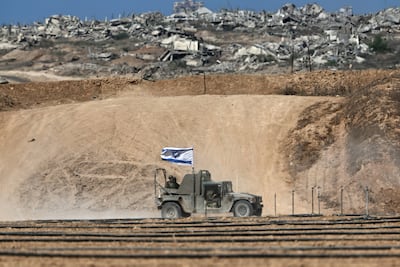The second anniversary of the Hamas attacks and the brutal Israeli war that followed is being marked by mounting international calls to halt the bloodshed and allow desperately needed aid into Gaza.
The appeals build on momentum driven by US President Donald Trump’s plan for a ceasefire in Gaza, where Israel’s campaign has been classified as genocide by the UN and several major aid groups.
Talks in the Egyptian resort city of Sharm El Sheikh began on Monday to discuss details of Mr Trump’s plan. Israel has approved it while Hamas has responded positively to key elements and demanded clarification on others.
Sources told The National that the two main sticking points are the fate of Hamas weapons and the burial sites of some of the dead hostages.
The first round of the talks ended "amid a positive atmosphere," Egyptian state-linked Al Qahera news reported early on Tuesday. Mr Trump also said he was "pretty sure" a deal would be reached to end the war, adding that it would extend to broader regional peace.
“I spoke with President Erdogan of Turkey. He’s fantastic. He’s been pushing very hard [for a deal]… and Hamas has a lot of respect for him. They have a lot of respect for Qatar, the UAE and Saudi Arabia,” Mr Trump said, adding that he also spoke with the King of Jordan.
With talks set to continue, mediators from Egypt, Qatar and Turkey will also be asking for a US guarantee that Israel will continue to observe a ceasefire in Gaza after Hamas hands over the hostages as part of the 20-point plan presented by Mr Trump last week, they said.
“A lasting ceasefire is critical to saving lives and breaking the cycle of death and destruction,” said Mirjana Spoljaric, president of the International Committee of the Red Cross on Monday. “Humanitarian assistance must resume at full capacity and be distributed safely to people in need, wherever they are."
Egypt’s President Abdel Fattah El Sisi said genuine peace in the Middle East “will not be realised except when a Palestinian state is established”. Mr Trump’s proposal could set the region on a path towards “permanent peace and lasting stability”, Mr El Sisi added.
But despite renewed hopes for a breakthrough and Mr Trump’s call for Israel to halt its offensive, Israeli forces have continued shelling Gaza. Dozens of Palestinians have been killed since the plan was announced last week. Aid remains merely trickling in and famine continues to grip the besieged enclave.
At least seven Palestinians were killed in Israeli attacks across Gaza on Monday. The medical charity Doctors Without Borders (MSF) said one of its Gaza staff members had died from injuries sustained in a previous Israeli strike, the 15th MSF member to be killed since the war began.
Speaking to The National following a recent trip to Gaza, Claire Magone, director general of MSF France, said what began as a carpet-bombing campaign by Israel on October 7, 2023 has become a “loud and clear genocide” against Palestinians.

Isolation and boycotts
As the war enters its third year, there is growing debate over whether Israel is truly “winning” the war in Gaza – now the longest in its history. Despite Prime Minister Benjamin Netanyahu’s promises of “total victory” and boasts of major military successes, many Israelis disagree.
“It’s a mixed bag. I don’t think there is a way out of the very bottom line that we lost the war on October 7,” Nimrod Novik, an Israeli peace negotiator and former senior adviser to the late prime minister Shimon Peres, told The National.
Former senior diplomat Alon Pinkas offered a similar view, saying Israel’s regional achievements were overstated. “In his mind, he’s winning because he deludes himself into thinking that he actually reshaped the Middle East but it was temporary.”
Israel’s deepening isolation, accusations of genocide and anger among allies have triggered what Israelis are calling a “diplomatic tsunami”. The term gained weight after many of Israel’s closest western partners recognised a Palestinian state.
Polling from leading think tank the Israel Democracy Institute showed a “notable shift” in public perception. While a multifront war remains the top concern, worries about “international isolation and boycotts” have more than doubled in the past year, and fears of “losing US support” have nearly doubled.
A New York Times survey found support for Israel among US voters had dropped 13 percentage points over the past year. A Washington Post poll showed that 61 per cent of American Jews believe Israel has committed war crimes, and about four in 10 said it is guilty of genocide.
For its part, two years of war and a string of assassinations that wiped out most of its senior leaders have left Hamas in survival mode. Sources who deal directly with its leadership told The National that the group is in disarray, with a broken chain of command and sporadic communication between fighters in Gaza and political figures abroad.
“Hamas is at its weakest ever,” said one source. “The only bargaining chip it now has is the hostages. Militarily, only a negligible number of active fighters are left in the field."
Palestinians in Gaza have paid the heaviest price. Israel’s army has killed more than 66,000 people and wounded at least 169,000 since the Hamas attacks that killed around 1200 Israelis.
As calls grow louder for a ceasefire and accountability, the world’s patience with Israel’s war has run thin. Whether the Trump plan can truly end the bloodshed or become another failed peace initiative remains to be seen, Arab diplomats told The National.

